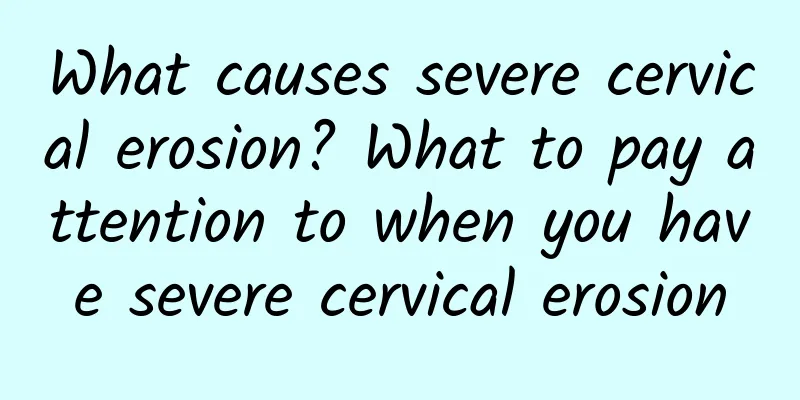How to take care of women after abortion? There are eight major hazards of abortion for women.

|
Many women get pregnant unexpectedly, but when they are unable to keep the baby, they will choose to have an abortion to achieve the effect of contraception. Experts remind that abortion is harmful to women's health, so they should take timely health care. The following introduces the harm of abortion and health care methods after abortion for your reference. In modern society, people's minds are becoming more and more open, and there are more and more unmarried men and women living together, which leads to an increase in the number of women who have unexpected pregnancies. Unexpected pregnancies bring a lot of inconveniences to life and work, so many people choose to have an abortion. Although an abortion is a minor operation, it has a great impact on women's health. So what are the dangers of having an abortion for women? How to maintain health after an abortion? The following will introduce them one by one for your reference. What are the dangers of abortion for women? 1. Endometriosis Repeated suction of uterine cavity contents may cause adhesion of the uterine cavity and cervical canal, and may also cause intrauterine blood accumulation or menstrual blood to flow back into the abdominal cavity, causing endometriosis and cyclical lower abdominal pain. 2. Long-term complications Such as chronic pelvic inflammatory disease, abnormal menstruation, secondary infertility, and endometriosis. 3. Uterine perforation, life-threatening During pregnancy, the uterine wall becomes soft and thin. Multiple pregnancies and multiple abortions can easily pierce the soft and thin uterine wall, causing uterine perforation and endangering life. 4. Complications during subsequent pregnancy Infertility, high rates of late miscarriage, high rates of premature birth, high perinatal mortality, increased rates of antepartum and postpartum bleeding, and increased neonatal hemolytic disease. 5. Amenorrhea Continuous abortions will damage the basal layer of the endometrium repeatedly, causing the functional layer to be unable to grow again. At this time, although the ovaries are fully functional and ovulate on time every month, the functional layer of the endometrium cannot regenerate after shedding, so menstruation will not occur, resulting in amenorrhea. 6. Dystocia and retained placenta during subsequent pregnancy Repeated abortions often require scraping of the endometrium. The more times the scraping is done, the more damage the endometrium suffers. When you want to get pregnant again, placenta implantation and adhesion are more likely to occur, resulting in dystocia and retained placenta. 7. Recent complications Incomplete artificial abortion, vaginal bleeding lasting more than 15 days after surgery; endometritis, adnexitis, pelvic inflammatory disease, etc. due to infection with pathogenic bacteria within 2 weeks after surgery; intrauterine blood accumulation; intrauterine adhesions, postoperative amenorrhea or significantly reduced menstrual volume, sometimes accompanied by periodic lower abdominal pain or uterine enlargement and blood accumulation. 8. Intraoperative Complications Abortion syndrome is also known as cardio-cerebral syndrome, with an incidence rate of 12%. The patient suddenly develops a series of symptoms such as bradycardia, arrhythmia, low blood pressure, pale face, profuse sweating, etc. In severe cases, even fainting and convulsions may occur; uterine perforation; missed aspiration, failure to aspirate the embryonic tissue, and the pregnancy continues to develop. How to take care of yourself after abortion? 1. You need to rest for 2 weeks after painless abortion. 2. Do not take a sitz bath within 2 weeks or before vaginal bleeding has stopped. 3. Within 2 weeks after the operation, rest in bed appropriately and avoid heavy physical labor. 4. Keep the vulva clean and hygienic, wash it with warm water 1 to 2 times a day, and change sanitary napkins frequently. 5. Avoid sexual intercourse within one month to prevent genital infection. If you have fever, abdominal pain or vaginal discharge with an abnormal odor, seek medical attention immediately. 6. Eat more nutritious food to restore your body to normal as soon as possible. Generally speaking, avoid cold drinks 7 to 10 days after surgery and avoid spicy food within one month. 7. Generally, vaginal bleeding stops gradually in 3 to 5 days and lasts no longer than 10 to 15 days. If the amount of vaginal bleeding exceeds the amount of menstrual blood and lasts for too long, you need to seek medical treatment in time. 8. After painless artificial abortion, as long as you resume your sexual life, you must take contraceptive measures to avoid getting pregnant again. Under normal circumstances, the endometrial repair period is about half a year. Therefore, special attention should be paid to prevent the uterus from being damaged by another pregnancy. |
<<: Does cervical erosion hurt women? Cervical erosion has 5 hazards to women
Recommend
What is leakage during abortion?
When the embryonic sac and main placental tissue ...
Experts briefly analyze the common classification of cervical erosion
According to the time of occurrence of cervical e...
We need to know the causes of vaginitis
In recent years, the incidence of vaginitis has b...
Can severe cervical erosion lead to death?
Will severe cervical erosion lead to death? How s...
What are the dietary taboos for women who have abortion?
Women must pay attention to their bodies during p...
Be extremely cautious when it comes to painless abortion
When we turn on the TV, we often see advertisemen...
What to do if an ovarian cyst grows
Ovarian cysts are a common gynecological disease,...
What causes adenomyosis? Is miscarriage the cause of adenomyosis?
What causes adenomyosis? Is miscarriage the cause...
What are the specific manifestations of the harm of adnexitis?
Adnexitis is very common among female compatriots...
Can I have an abortion when I am 3 months pregnant?
The timing of abortion surgery is very special. I...
How to prevent Bartholinitis
Overview of Bartholinitis: Bartholin glands, also...
There are two main treatments for ectopic pregnancy
Ectopic pregnancy is a common gynecological disea...
"Sour cabbage" is a good stomach and intestines dish that will make you drool.
If you have constipation, excessive stomach acid,...
Introduction to the diagnosis method of dysmenorrhea from the perspective of Western medicine
Western medicine divides dysmenorrhea into primar...
Under what circumstances does chronic cervicitis occur? What are the prevention methods for chronic cervicitis?
When women reach a certain stage, they will get m...









